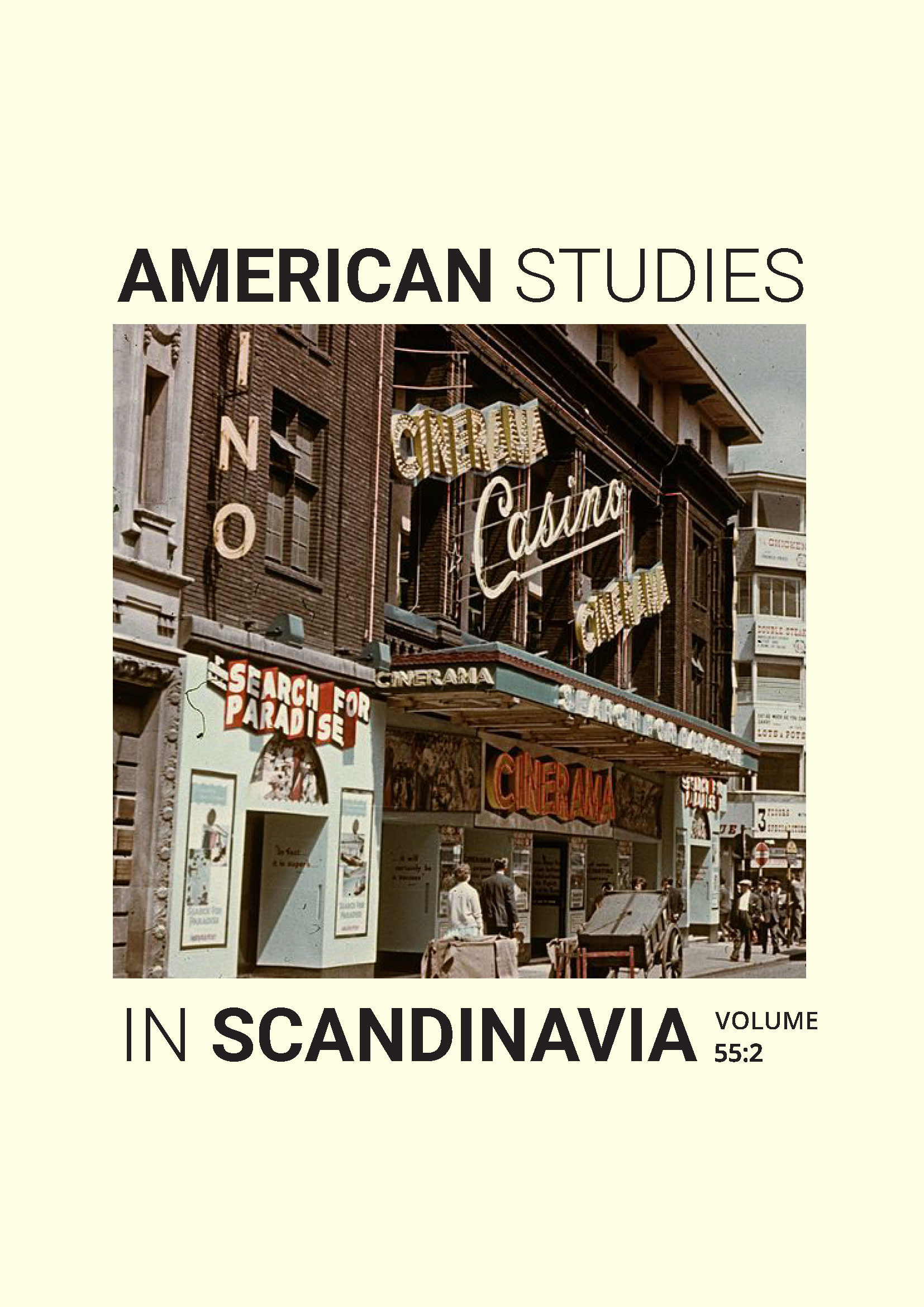Is It Really Happening? The Postmodern Horror of Roman Polanski’s Rosemary’s Baby
DOI:
https://doi.org/10.22439/asca.v55i2.7039Keywords:
horror film, Hollywood cinema, postmodernism, paranoia, metanarrativesAbstract
This article examines Roman Polanski’s film Rosemary’s Baby (1968) as both a symptom and a manifestation of the cultural and political upheavals of the late 1960s. Released in an era marked by rampant conspiracy theories and a growing opposition to established hierarchies and institutions, the film constitutes a prime example of “paranoid horror.” Reflecting the collapse of commonly accepted metanarratives such as religion and the American nuclear family, Rosemary’s Baby adamantly rejects the restoration of order that earlier horror movies would have provided. In fact, by questioning ontological reliability, it epitomizes the shift from the classical to the postmodern horror narrative.
References
Biskind, Peter. Seeing is Believing: How Hollywood Taught Us to Stop Worrying and Love the Fifties. New York: Henry Holt, 2000.
Braudy, Leo. The World in a Frame: What We See in Films. Chicago: Chicago University Press, 2002.
Cheever, John. Bullet Park. New York: Knopf, 1967.
Clover, Carol J. Men, Women, and Chain Saws: Gender in the Modern Horror Film, with a new preface by the author. Princeton, NJ: Princeton University Press, 2015. https://doi.org/10.1515/9781400866113.
Derry, Charles. “More Dark Dreams: Some Notes on the Recent Horror Film.” American Horrors: Essays on the Modern American Horror Film, edited by Gregory A. Waller, Chicago: University of Illinois Press, 1987. 162–74.
Dillard, R. H. W. “Night of the Living Dead: It’s Not Like Just a Wind That’s Passing Through.” American Horrors: Essays on the Modern American Horror Film, edited by Gregory A. Waller, Chicago: University of Illinois Press, 1987. 14–29.
Fischer, Lucy. “Birth Traumas: Parturition and Horror in Rosemary’s Baby.” The Dread of Difference: Gender and the Horror Film, 2nd ed., edited by Barry Keith Grant, Austin: University of Texas Press, 2015. 439–58.
Grant, Barry Keith, editor. Planks of Reason: Essays on the Horror Film. Metuchen, NJ: Scarecrow Press, 1984.
---, editor. The Dread of Difference: Gender and the Horror Film. 2nd ed., Austin: University of Texas Press, 2015.
Hertzberg, Hendrik and David C. K. McClelland. “Paranoia: An Idee Fixe Whose Time Has Come.” Harper’s, June 1974.
Hogan, David J. Dark Romance: Sexuality in the Horror Film. Jefferson, NC: McFarland, 1986.
Hutcheon, Linda. A Poetics of Postmodernism: History, Theory, Fiction. New York: Routledge, 1988.
Jancovich, Mark. Rational Fears: American Horror in the 1950s. Manchester: Manchester University Press, 1996.
Jones, Darryl. Horror: A Thematic History in Fiction and Film. London: Arnold, 2002.
Keetley, Dawn. “Sleep and the Reign of the Uncanny in Postrecession Horror Film.” Journal of Popular Culture, 52.5 (2019): 1017–35. https://doi.org/10.1111/jpcu.12842.
Kinder, Marsha and Beverle Houston. “Rosemary’s Baby.” Sight and Sound, 38.1 (1968–69): 17–19.
---. “Seeing is Believing: The Exorcist and Don’t Look Now.” American Horrors: Essays on the Modern American Horror Film, edited by Gregory A. Waller, Chicago: University of Illinois Press, 1987. 44–61.
Lev, Peter. American Films of the 70s: Conflicting Visions. Austin: University of Texas Press, 2000.
Levy, Peter B. The Great Uprising: Race Riots in Urban America During the 1960s. Cambridge: Cambridge University Press, 2018. https://doi.org/10.1017/9781108381659.
Lyotard, Jean-François. The Postmodern Condition: A Report on Knowledge. Translated by Geoff Bennington and Brian Massumi, Minneapolis: University of Minnesota Press, 1984. https://doi.org/10.2307/1772278.
Marcus, Sharon. “Placing Rosemary’s Baby.” Differences: A Journal of Feminist Cultural Studies, 5.3 (1993): 121–53. https://doi.org/10.1215/10407391-5-3-121.
McHale, Brian. Postmodernist Fiction. New York: Methuen, 1987.
Melley, Timothy. Empire of Conspiracy: The Culture of Paranoia in Postwar America. Ithaca, NY: Cornell University Press, 2000.
Newton, Michael. Rosemary’s Baby. London: British Film Institute, 2020. https://doi.org/10.5040/9781838719074.
Pinedo, Isabel Cristina. “Postmodern Elements of the Contemporary Horror Film.” The Horror Film, edited by Stephen Prince, New Brunswick: Rutgers University Press, 2004. 85–117. https://doi.org/10.36019/9780813542577-006.
Schlepfer, Zoé Iris. “I can no longer associate my self. Zu einer Poetik der unheimlichen Atmosphäre mit Rosemary’s Baby.” Filmische Seitenblicke: Cinepoetische Exkursionen ins Kino von 1968, edited by Hermann Kappelhoff, Christine Lötscher, and Daniel Illger, Berlin: De Gruyter, 2018. 163–90. https://doi.org/10.1515/9783110618945-009.
Sharrett, Christopher. “The Horror Film in Neoconservative Culture.” The Dread of Difference: Gender and the Horror Film, 2nd ed., edited by Barry Keith Grant, Austin: University of Texas Press, 2015. 281–304.
Sobchack, Vivian. “Bringing It All Back Home: Family Economy and Generic Exchange.” The Dread of Difference: Gender and the Horror Film, 2nd ed., edited by Barry Keith Grant, Austin: University of Texas Press, 2015. 171–91.
Stoker, Bram. Dracula. London: Penguin, 2003.
Tudor, Andrew. Monsters and Mad Scientists: A Cultural History of the Horror Movie. Oxford: Blackwell, 1989.
Valerius, Karyn. “Rosemary’s Baby, Gothic Pregnancy, and Fetal Subjects.” College Literature, 32.3 (2005): 116–35. https://doi.org/10.1353/lit.2005.0048.
Vidler, Anthony. The Architectural Uncanny: Essays in the Modern Unhomely. Cambridge, MA: MIT Press, 1992.
Waller, Gregory A., editor. American Horrors: Essays on the Modern American Horror Film. Chicago: University of Illinois Press, 1987.
---. “Introduction.” American Horrors. 1–13.
Wells, Paul. The Horror Genre: From Beelzebub to Blair Witch. London: Wallflower, 2000.
Wexman, Virginia Wright. “The Trauma of Infancy in Roman Polanski’s Rosemary’s Baby.” American Horrors: Essays on the Modern American Horror Film, edited by Gregory A. Waller, Chicago: University of Illinois Press, 1987. 30–43.
Williams, Tony. Hearths of Darkness: The Family in the American Horror Film. Updated ed., Jackson: University Press of Mississippi, 2014.
Wise, David and Thomas B. Ross. Invisible Government. New York: Random House, 1964.
Wood, Robin. “An Introduction to the American Horror Film.” American Nightmare: Essays on the Horror Film, edited by Robin Wood and Richard Lippe, Toronto: Festival of Festivals, 1979. 7–28.
---. Hollywood from Vietnam to Reagan. New York: Columbia University Press, 1986.
Downloads
Published
How to Cite
Issue
Section
License
Copyright (c) 2023 Thorsten Carstensen

This work is licensed under a Creative Commons Attribution-NonCommercial-NoDerivatives 4.0 International License.



